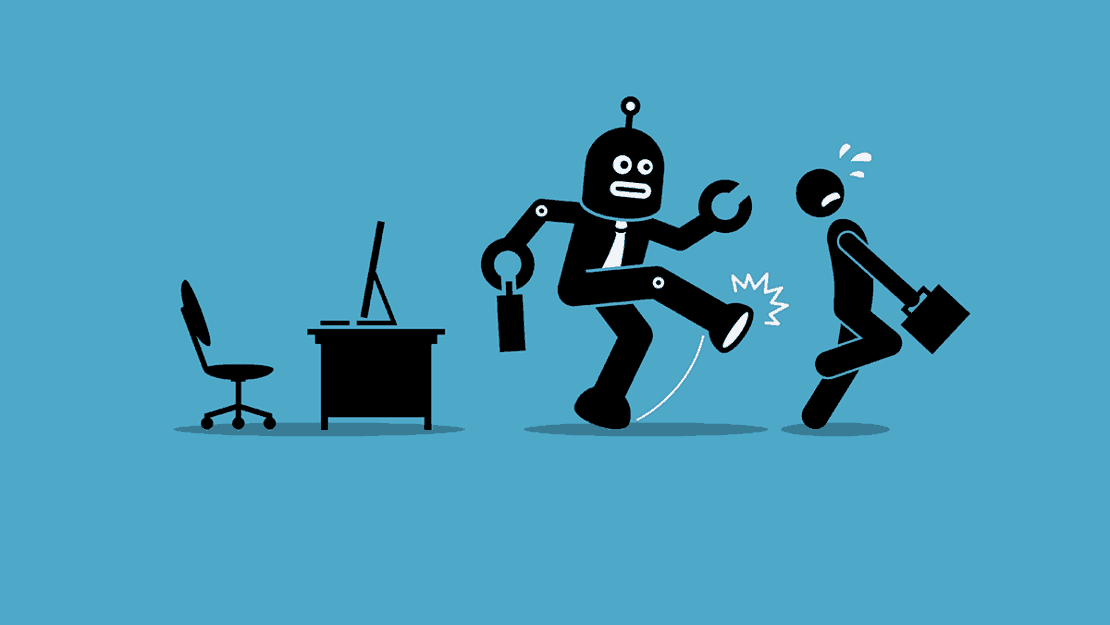4May2017
Work is changing like never before. According to International Labour Organization (ILO), technology advances are one of the key drivers of what people do and how they do it, besides globalization, climate change, and growing inequality. The Internet and digital technology are mediating work in entirely new ways, being disruptive, yet giving people the option to earn their living with meaning and direction.
So, what kind of future will that be? What does this mean for knowledge workers? Will technological unemployment become their reality or will they simply work smarter?
Disrupting the world of work
According to Boston Consulting Group survey, up to a quarter of jobs will be replaced by 2025 by either smart software or robots. Also, a study from Oxford University suggests that 35% of existing U.K. jobs are at risk of automation in the next 20 years.
So, with job robotization on the rise, humanization becomes a must. As more workers opt to work in or out of different time zones, building meaningful relationships becomes more difficult.
In their recent book The Future Workplace Experience: 10 Rules For Mastering Disruption in Recruiting and Engaging Employees, Jeanne Meister and Kevin Mulcahy look at how technology is both disrupting and enabling jobs. They write, for instance, that the expectation of social and collaborative tools in the workplace is no longer a millennial issue only: “57 percent of individuals across the ages of 22 and 52 bring digital expectations to the workplace.”
Also, systems will collaborate with humans, changing the nature of work and reimagining work content and process.
“Humans will need to learn to collaborate and in some instances be led by smart systems,” said Joe Carella, Assistant Dean of Executive Education at the University of Arizona. “Knowledge workers will be particularly reluctant initially to allow systems to make autonomous decisions. The temptation to override them will be strong and especially initially justified. It will take a while for smart systems to match our complexity of thought which derives from ingenuity and collaboration.”
Then there is the lack of automation, which hinders how work is being done. A recent study conducted by Adobe across several European countries shows that European knowledge workers spend nearly a full working day per week performing repetitive administration duties.
Victoria Palmer, EMEA Talent Enablement and Operations Manager at Adobe, says that “wrong processes and the lack of technology result in lost contracts, long working hours and many other issues resulting in time delays and frustrations for all parties involved.”
Christy Hopkins, Human Resources consultant and writer at Fit Small Business, a company that helps small business owners achieve success faster with proven resources, tools, and advice, believes that the future of work is impacting organizations by causing them to do some self-reflection and introspection on the cultural aspects of their business, as well as on the technology decisions they have made. This impacts knowledge workers because they are, and will be for a long time, in increasingly high demand.
The location of work is also a factor. Karoli Hindriks, CEO, and the founder of Estonian-based startup Jobbatical, which connects top talent to employers globally for short term tech gigs, knows too well the difficulties and limitations of reaching certain talent and, in more remote areas of the world, settling with the available talent instead of finding the best person for the job.
Hindriks highlights the impact of the mobility element as people are changing jobs more often than they used to: “Some sources show that the average tenure in tech is already as short as 18-24 months globally. When people change jobs more often, companies have to work harder at retaining them as well as attracting new people.”
Enabling knowledge workers
“The world is changing and every day becomes even more digital. There will be more flexibility for workers and easier workflows with less friction and significantly fewer disruptions – as long as organizations invest in the right technology,” said Palmer.
She added that processes like talent onboarding, signing approvals and closing out agreements will literally be just a fingertip or a swipe away from workers: “Documents will be more flexible and we might not only use screens to interact with forms but in the future may potentially start having conversations with a form in order to fill in the required data.”
What Adobe does as a company is, basically, introducing technology that enables employees to take advantage of the innovations in digitization, and actively foster an environment where they can benefit from such improvements.
“Our sales team can issue all of our sales agreements with electronic signatures directly to our customer’s inboxes for tracking and signing on any device. And we offer and onboard all our own employees worldwide using electronic signatures,” explained Palmer.
This enables people to learn deeply about the technologies they’re selling and share the great experiences with their customers. Palmer added: “There is a lot we can do and we encourage everyone to be open to new possibilities and discover their potential.”
On the other hand, when it comes to possibilities and potential, geographically speaking, there are no boundaries anymore – mobility and ability to work remotely are appreciated and find their way into the mainstream. Working anywhere, anytime becomes the norm.
“As individuals, our comfort zones have expanded globally with the networked age,” noticed Hindriks who added: “Fifteen years ago our comfort zone was very much connected to our geographical location. Today our friendships run in verticals of interests, so my best friend can be in Tokyo, Barcelona or Sydney, which means that we are getting more comfortable moving around those locations. This means that suddenly finding great talent is not only the privilege of the nerve centers of the world.”
Also as a Millennial, with friendships spanning from California to Australia, she realized that her generation has become keener to move abroad. “Companies around the world need opportunities for sourcing talent internationally, that’s what Jobbatical does,“ added Hindriks.
With the rise of Artificial Intelligence and increasingly shorter innovation cycles, Future of Work will transform knowledge workers into learning workers, thinks Dina Amouzigh, who leads People’s Operations at online doctor review portal CareDash. It’s no longer about what you already know, but how well you learn, adapt and grow.
“The focus will shift to the traditional soft skills: communication and collaboration, with a newfound emphasis on empathy and interdisciplinary thinking. The job of organizations and HR professionals will be to create a culture of innovation through these changes that rewards development, bias towards action and failure. We must provide workers with the autonomy to take risks and the resources to keep on growing,” said Amouzigh.
Knowledge workers will be more attractive and valuable to any organization as long as they keep up with the fast pace of technology change, applying what they learn to a wide range of situations, and innovating as they go.


